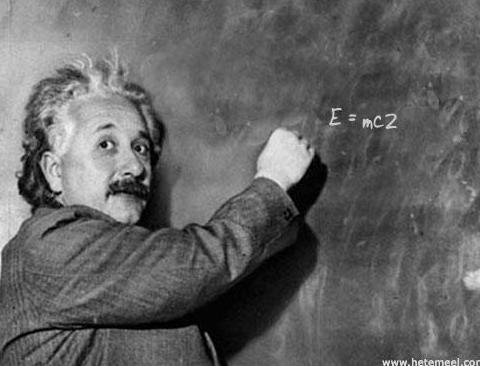Einstein’s Law of Relativity challenged by experiment
Albert Einstein (Photo: hetemeel.com)
Story by The Takeaway. Listen to audio for full report.
Albert Einstein’s Law of Relativity is one of the few scientific equations most people know — and it’s a pillar of modern physics and fundamental to the way that the universe works. The equation states that nothing is faster than the speed of light, but one of the world’s foremost laboratories says they’ve found subatomic particles called neutrinos that travel even faster. If their findings are proven true, it may alter our understanding of the universe.
In Einstein’s famous equation, E=mc2, the constant “c” is the speed of light, which is the same everywhere in the universe: c = 186 thousand miles per second, and there is nothing faster. The constant been accepted for more than a century.
Now, an international team of physicists who spent three years studying neutrinos — little particles — traveling between the CERN laboratory in Switzerland to a lab in Gran Sasso Italy about 450 miles away, say the neutrinos reached their destination 60 nanoseconds faster than the speed of light.
According to Einstein, neutrinos have mass and are therefore, matter — and matter can’t travel faster than the speed of light.
The Swiss scientists are looking forward to their experiment being independently repeated, as many other scientists are skeptical of their findings.
“You have to take these results with a big huge grain of salt,” said Brian Greene, professor of physics at Columbia University and author of “The Elegant Universe: Superstrings, Hidden Dimensions, and the Quest for the Ultimate Theory.”
“It’ll be a revolution if it’s right, but my guess is it’s probably not going to stand up to scrutiny,” Greene added.
David Kaiser, physics and history of science professor at MIT and author of “How the Hippies Saved Physics: Science, Counterculture, and the Quantum Revival,” thinks it’s too early yet to make guesses about how the CERN experiment impacts current thinking about the universe.
“We’re very likely to find a much, much more mundane answer,” said Kaiser “It could very likely be a more straightforward, but stubborn measurement error.”
An illustration of the Cern experiment from BBC News:

More about the CERN experiment:
> Speed-of-light experiments give baffling result at Cern
> Physicists urge caution over apparent speed of light violation
–—————————————–
“The Takeaway” is a national morning news program, delivering the news and analysis you need to catch up, start your day, and prepare for what’s ahead. The show is a co-production of WNYC and PRI, in editorial collaboration with the BBC, The New York Times Radio, and WGBH.
